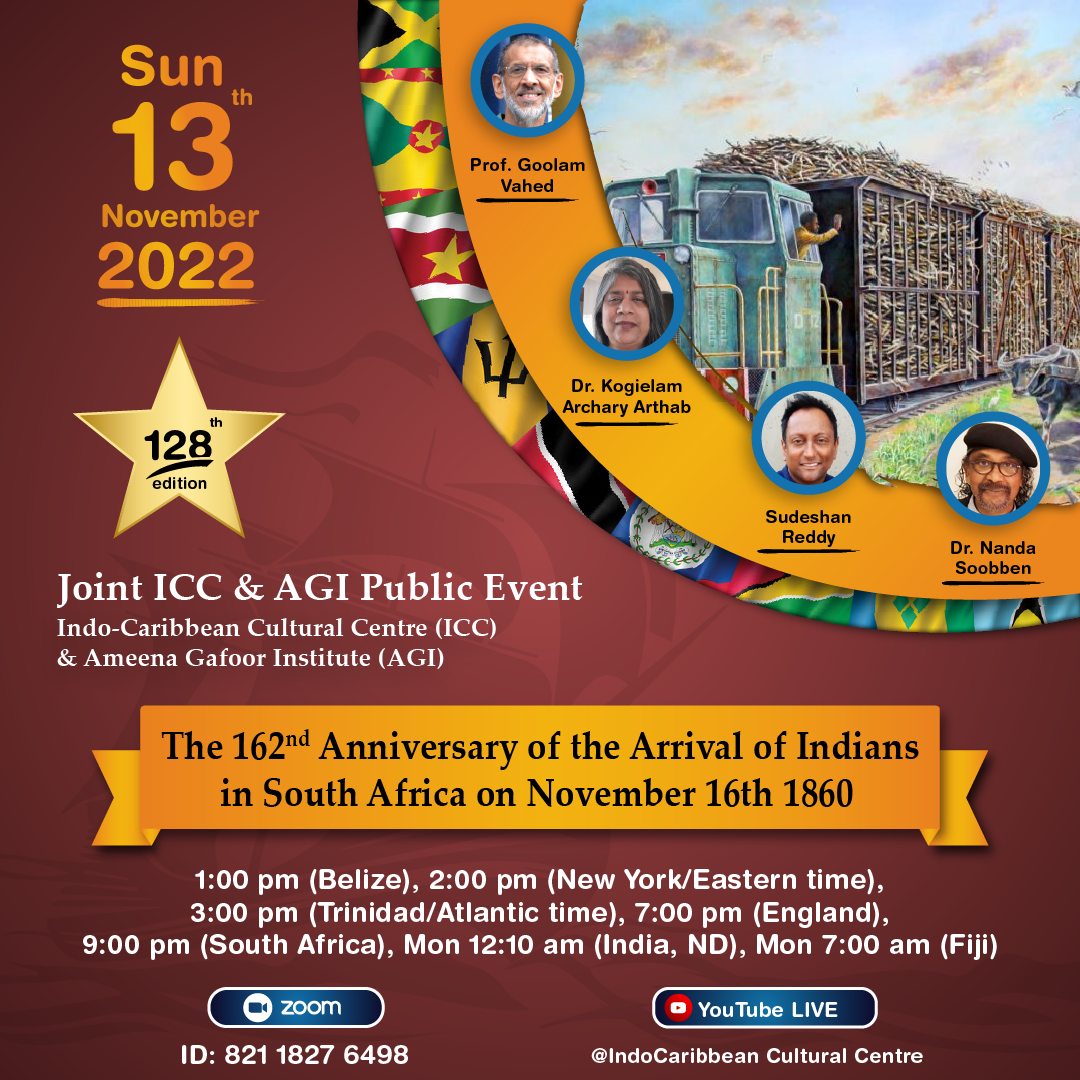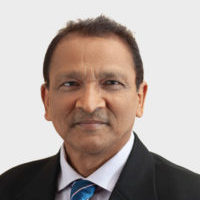
Invitation to our 128th weekly ICC (+AGI) ZOOM public meeting by Staff Reporter
The first Asian Indians in South Africa arrived as slaves from 1683 onwards during the Dutch colonial era in 1684. It is estimated that over 16,300 enslaved Indians were brought to the Cape. From 1690 to 1725, approximately 80% of slaves were Indians. This practice continued until the end of slavery in 1838. By the 1880s, they were totally integrated into the Cape White and Coloured communities.
Contemporary Indian South Africans are descendants of indentured labourers and free migrants who left British India from 1860 onwards. On November 16, 1860, the ship named S.S. Truro carried 342 indentured Indians from Madras to South Africa, marking the beginning of a long and painful period in history. That ship was followed by the Belvedere from Calcutta, and many others thereafter. The last ship, the Umlazi, arrived on July 11, 1911. Indentured labourers worked on the sugarcane plantations of Natal Colony (now the province of KwaZulu-Natal). Between November 1860 and 1911 (when the system of indentured labour was stopped), 152,184 indentured labourers from across India arrived in Natal. By 1910, nearly 27 percent of ex-indentureds had returned to India. A third category of migrants that arrived in South Africa were ‘free’ or “passenger” Indians, who were mainly traders travelling at their own expense from India, Mauritius, and other places.
The South African Indian community is associated with Mahatma Gandhi, whose 21 years in the country were formative in his mission to lead India’s freedom struggle. Today, Indians of South Africa constitute the second largest ethnic group (1.5 million, as of 2021) in the African Continent. The majority of them live in and around the city of Durban in KwaZulu-Natal, making it home to the largest population of Indians outside of India.Please join us THIS SUNDAY for the 128th weekly ICC (+AGI) ZOOM Public Meeting, November 13, 2022 at (1.00 p.m. Belize), (2.00 p.m. New York/Eastern time), (3.00 p.m. Trinidad/Atlantic time), (3.00 p.m. Guyana), (4.00 p.m. Suriname), (7.00 p.m. England), (9.00 p.m. South Africa), (Sun 12 midnight, India, ND), (Mon 7.00 a.m. Fiji).
TOPIC: The 162nd Anniversary of the Arrival of Indians in South Africa on November 16, 1860
SPEAKERS:
- Prof. Goolam Vahed– History Professor at the University of KwaZulu-Natal with interest in colonial encounters, transformations of Indian identities, Islam and Muslims in South Africa.
- Dr. Kogielam Keerthi Archary – Research Associate at the University of South Africa. Series Editor of Tell Your Mother’s Story, a publication of the Oral History Association.
- Sudeshan Reddy – Communication Specialist at the United Nations Children’s Fund (UNICEF) South Africa, formerly with the UN High Commissioner for Refugees and the UN Information Centre.
- Dr. Nanda Soobben – Award-winning, internationally-acclaimed political cartoonist, artist, journalist and animator published in the POST, Independent, Daily News, Sunday Tribune, etc.
Followed by Q&A
Join Zoom Meeting THIS SUNDAY by touching or clicking on this link:
https://us02web.zoom.us/j/82118276498
ZOOM Meeting ID: 821 1827 6498
No Passcode Needed
Find your local number: https://us02web.zoom.us/u/kcoy3zSsAb
Live-streamed on the YouTube channel of the Indo-Caribbean Cultural Centre
https://www.youtube.com/user/dmahab
Hosted by www.indocaribbeanpublications.com + https://ameenagafoorinstitute.org
WhatsApp +1 868 756 4961 or +1 868 381 0386
indocaribbeanstaff@gmail.com, dmahabir@gmail.com
Please SHARE

is a full-time anthropologist at the University of Guyana (UG) and Fellow of The Eccles Centre for American Studies, British Library (2022-23). He is a former Assistant Professor at the University of Trinidad and Tobago (UTT). He obtained his Ph.D. in Anthropology from the University of Florida (UF). As a doctoral student, he won a Florida Caribbean Institute Award, an A. Curtis Wilgus Grant, and an Organization of American States (OAS) Fellowship.
Mahabir received a National Award (Hummingbird Silver Medal) for his contribution to education in his country in 2011. He was among 50 recipients who received a Distinguished Alumni Award from the UWI Alumni Association.
Mahabir is the author of 12 books to date.
